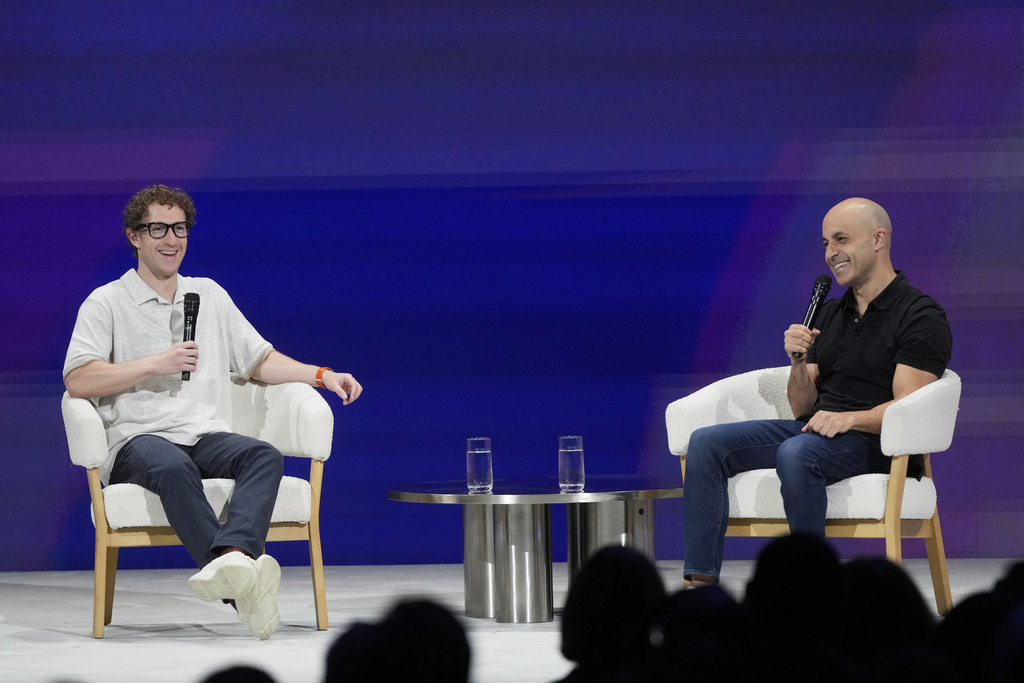In early May, Mark Zuckerberg made headlines for comments about how he sees the potential of AI to transform social isolation. In a conversation with podcaster Dwarkesh Patel, he pointed out that the “average American has fewer than three friends” and argued that the answer may not be in traditional policy solutions like reinvesting in community centers or expanding mental health support. “I think people are going to want a system that knows them well and understands them in the way that their feed algorithms do,” he continued, envisioning AI friends, companions, and therapists as the remedy for modern disconnection.
[time-brightcove not-tgx=”true”]
Zuckerberg’s prescription might sound extreme. But it begs profound philosophical questions: What does it mean to have a friend? Can algorithms ever replicate the complex and messy process of forging meaningful bonds with another being?
These are questions that we, as a society, need to answer. Quickly.
Zuckerberg is correct that there’s a real problem. The loneliness epidemic is increasingly serious. Surveys show that Americans’ in-person interactions have dropped by as much as 45% in recent years across certain groups. Beyond simply loneliness, the challenge can be described in terms of falling trust and social cohesion—a deficit of belonging. There’s growing evidence that social media and the decline of in-person social connection have coincided with major increases in anxiety and depression, as well as political polarization and pessimism about the future. Today, the U.S. ranks last among G7 countries in terms of trust in public institutions.
The Meta founder is also right that AI can meet some of a person’s immediate emotional needs. Since the 1960s, when MIT researchers developed ELIZA, a program designed to mimic a psychotherapist, we’ve known that even basic AI interactions can provide temporary comfort. Contemporary studies even show that ChatGPT responses are rated highly in therapeutic contexts, suggesting these AI systems may provide accessible support without the biases and limitations of human therapists. While they may have their own biases and hallucinations, AI companions offer consistency, immediate availability, and can tailor interactions precisely to an individual’s preferences, something busy friends or family members can’t always do.
Read More: I’m a Therapist, and I’m Replaceable. But So Are You
Still, the case for preserving real human bonds isn’t just a romantic ideal or techno-skepticism. Connection is what makes us human, and despite Zuckerberg’s enthusiasm, there’s clear evidence that real human interaction can’t be replaced by machines. Researchers like Julianne Holt-Lunstad of Brigham Young University have demonstrated how face-to-face interactions reduce not only psychological distress but physical health problems, including cardiovascular disease. Neuroscientist Marco Iacoboni of UCLA highlights the role of “mirror neurons,” specialized brain cells activated only through direct human interactions, crucial for empathy and emotional understanding—capacities AI interactions cannot stimulate.
Human relationships are intricate and inherently messy, providing intangible benefits like growth through discomfort and emotional depth through complexity. Psychology research stretching back over 50 years shows that even unpleasant social interactions—including misunderstandings and disagreements—can foster personal empathy, problem-solving skills, and resilience. Overcoming social friction is integral to community-building.
There’s danger in normalizing the idea that human connection can be replaced by AI. It leads people to deprioritize investments in human connection. Rather than navigating a difficult but necessary conversation or making an effort to win someone’s trust, there’s the temptation to turn instead to the chatbot for companionship. In doing so, we run the risk of viewing ourselves as little more than machines. This is corrosive to human character as well as community.
There’s a simple reason why we hear a lot about human-centered solutions to the social connection crisis—including investments in mental health, youth programs, community centers, volunteerism, libraries, parks, and quality public spaces. They work. Decades of research validate that well-funded, vibrant public spaces and service-oriented initiatives significantly reduce loneliness and increase trust and social cohesion. Yet, our investments in these strategies remain insufficient.
The decline of religious institutions also plays a significant role in weakening social bonds. Religion has historically optimized rituals, intergenerational connections, community building, and opportunities to explore profound existential questions—all essential aspects of belonging. Though understandable reasons lead many people to distance themselves from organized religion, we can’t discard the wisdom these structures have built over centuries. As religious participation declines, one important answer is to create secular frameworks that similarly build common meaning and shared purpose among people—qualities that machines, by definition, cannot provide.
It’s easy to laugh off Zuckerberg’s comments as the musings of another out-of-touch tech mogul eager to automate humanity. But dismissing them isn’t enough. This is a moment that demands clarity and resolve around the irreplaceable value of human presence.
Zuckerberg accurately diagnoses our crisis of isolation. But the solution will not be automated.

